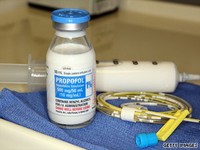A German manufacturer confirmed on Thursday that it took the extraordinary step of suspending shipments of a widely used drug to a U.S. distributor this year after 20 vials were mistakenly sent to the state of Missouri to be used in executions.
Drugmaker Fresenius Kabi said shipments of the anesthetic propofol were halted to a Louisiana distributor for 4 1/2 months through mid-March because the company feared the European Union would ban export of the drug altogether if it was used in executions.
"We felt it was important to make sure it was restricted to the healthcare professionals," said Geoffrey Fenton, a U.S. spokesman for the firm.
Propofol, which is mostly made in Europe, is administered about 50 million times a year in the U.S. during various surgical procedures, according to the manufacturer.
The Death Penalty Information Center said Missouri had been expected to become the first U.S. state to use the drug in an execution scheduled for October 23.
The death penalty is banned in the European Union, and the 27-country bloc, of which Germany is a part, bans the export of drugs for use in executions.
Fresenius Kabi said it had stopped shipments to Louisiana distributor Morris & Dickson LLC from November 1, 2012 to mid-March, 2013 after the U.S. firm inadvertently sent a carton containing 20 vials to Missouri's department of corrections.
The German company confirmed it had suspended the shipments a day after Missouri announced that it would return the drugs to the distributor. Missouri is taking the unusual step some 11 months after the distributor frantically pleaded for the return of the vials, according to emails recently made public.
A leading death penalty expert, Richard Dieter, executive director of the Death Penalty Information Center, said he had never heard of a drug firm suspending shipments to a distributor over their possible use in U.S. executions.
The move shows how U.S. states and suppliers of drugs are coming under strong pressure from big pharmaceutical companies, especially in Europe, not to use supplies in executions.
The campaign against the death penalty has forced death-penalty states to change the drugs they use in lethal injections, find new supplies of existing drugs, or buy drugs from lightly regulated compounding pharmacies.
The American Civil Liberties Union of Missouri Foundation filed a lawsuit against the Department of Corrections on October 4 in an attempt to obtain information about the state's supply of propofol.
According to one of the documents posted on the ACLU's website the distributor mistakenly sent propofol to the department of corrections on September 26 or 27, 2012.
A salesperson for the distributor spent the "entire day" on November 1 at the state prison in Bonne Terre, Missouri, attempting in vain to retrieve the propofol, according to an email sent to George Lombardi, director of the department of corrections, from Dale Kelley, vice president of purchasing at Morris & Dickson.
In the email, Kelley said Fresenius Kabi had suspended distribution of propofol to Morris & Dickson, a move that would "cause irreparable harm to the medical community which we serve."
The email said the suspension would affect thousands of patients in need of the anesthetic at more than 600 hospitals in the Midwest and southern United States.
"Please - Please - Please HELP ...this system failure - a mistake - 1 carton of 20 vials - is going to affect thousands of Americans," he wrote.
The salesperson was told that approval to give the drug back had to come from Lombardi or Missouri Governor Jay Nixon, according to the email from Kelley to Lombardi.
The suspension did not end up restricting supply of propofol in the United States because Fresenius Kabi delivered the drug directly to hospitals rather to the distributor, Fenton said.
An audit was conducted of Morris & Dickson to ensure the sale of the drug to prisons would not happen again and then supplies to the distributor were resumed, he said.
Fresenius Kabi sells propofol to a total of 14 U.S. distributors, which agree not to sell the drug to jails and prisons, Fenton said.
Missouri state officials did not respond to requests to comment about the incident.
The state had been expected to use propofol for the execution of convicted murderer Allen Nicklasson scheduled for October 23, according to the Death Penalty Information Center.
Source: Reuters, October 11, 2013










